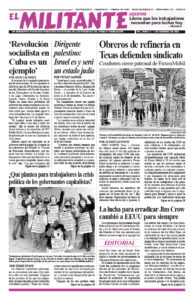Former Republican Gov. Matt Bevin of Kentucky pardoned 670 prisoners who had been convicted by state courts there as he left office at the end of 2019. Over two years later U.S. District Court Judge Claria Horn Boom sentenced one of them, Patrick Baker, to 42 years in prison for exactly the same crime, sending him back to prison.
Boom’s Jan. 18 ruling openly flouts protections in the Bill of Rights against double jeopardy that are crucial for the defense of working people, our unions and our struggles. The Fifth Amendment to the U.S. Constitution says no person may “be subject for the same offense to be twice put in jeopardy of life or limb.” It was adopted in 1791 as a result of protests by workers and artisans demanding greater protections against government persecution.
In his executive order pardoning Baker, Bevin wrote that evidence supporting his conviction was “sketchy at best.”
But liberal politicians who had hounded Bevin throughout his term in office were determined to undermine his pardons. They seized on the Baker case, claiming his family had “bought” the pardon. They say it was granted because the family organized a fundraiser that raised $21,500 to help Bevin pay off his campaign debt.
In 2014, Baker was addicted to oxycodone and, along with a friend, attempted to rob a well-known drug dealer at his home. They dressed up as U.S. marshals. In the course of the robbery, Donald Mills, the dealer, was shot and killed. Baker maintains his innocence.
In 2017 a Knox County Circuit Court jury found Baker guilty of reckless homicide, robbery, impersonating a peace officer and tampering with physical evidence. Reckless homicide is the least serious charge in Kentucky that can be brought when someone is killed during another crime. It is similar to the “felony murder” charge on the books in many other states. Because of the number of charges he was convicted of, Baker was sentenced to 19 years in prison.
Despite Baker receiving the pardon, federal prosecutors organized a grand jury after Bevin left office that indicted Baker last May for the very same crime. This time he was convicted of a more weighty federal charge, “murder committed during a drug trafficking crime,” and he was given a 42-year sentence. Assistant U.S. Attorney Jenna Reed argued for a tougher sentence than the one he received in 2017, claiming that this would deter future drug-related crime. Baker’s new sentence was more than twice as long as his original conviction.
When Baker was pardoned in 2019, his attorney, Elliot Slosar, said he “is free today because DNA evidence clears him from committing murder,” and “because eyewitness descriptions have never matched him.” Slosar pointed out that the two cops who led the investigation are being sued for false statements in other trials. State authorities erased data on Baker’s cellphone that he had wanted to present to the jury in his defense.
‘Dual sovereignty’ doctrine
To throw out protection against double jeopardy, more prosecutors and judges in recent years claim state and federal governments have “dual sovereignty.” They say they are two separate jurisdictions and an identical offense tried in a state court can also be tried again in federal court, or vice versa.
In 2019 the U.S. Supreme Court upheld dual sovereignty in a 7-to-2 ruling in Gamble v. the United States. In 2015 Terance Gamble, a freed felon, was caught with a firearm in his car, which is illegal in Alabama. He was sentenced to a year in prison. But after being released, he was arrested and convicted again for the same offense in federal court and sent back to prison.
Justices Ruth Bader Ginsburg and Neil Gorsuch filed opinions sharply disagreeing with the ruling. Ginsburg said the Bill of Rights’ disallowance of double jeopardy should be upheld. She wrote that the U.S. and its constituent states “compose one people, bound by an overriding Federal Constitution. Within that ‘WHOLE,’ the Federal and State Governments should be disabled from accomplishing together ‘what neither government [could] do alone — prosecute an ordinary citizen twice for the same offence.’”
The use of “dual sovereignty” to trample on constitutional protections gives the rulers another weapon to target and frame up workers. It allows them to prosecute defendants until they can find a court to give them a guilty verdict.
Every time the rulers weaken constitutional protections — no matter who is on trial or for what crime — they deal a blow to rights working people need. Under capitalism workers are always potential defendants in the rulers’ criminal “justice” system and we need to jealously guard every one of these protections.
Baker is now appealing the federal district court’s sentence.

